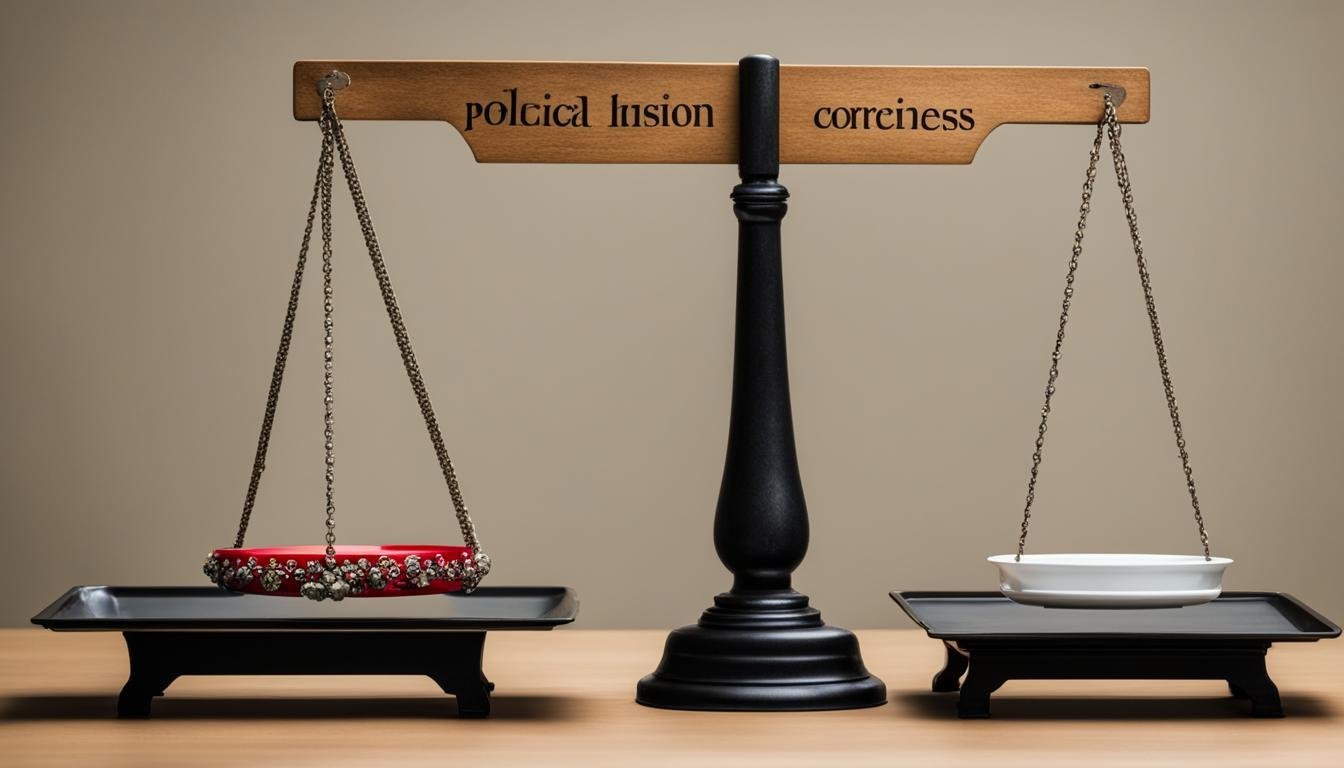Diversity and inclusion have become important topics in the workplace, but it’s essential to find the right balance between promoting inclusion and avoiding political correctness. While sensitivity to race, religion, or gender is crucial, it can sometimes hinder effective relationships across diverse lines. Companies should focus on equipping employees with skills rather than strict rules to navigate these tensions and build stronger relationships.
Key Takeaways:
- Finding the right balance between inclusion and political correctness is crucial in the workplace.
- Equipping employees with skills can help navigate tensions and build stronger relationships.
- Avoiding strict rules and fostering cultural awareness can promote genuine inclusion.
- Effective diversity training and equitable policies are essential for creating an inclusive environment.
- Building meaningful relationships across diverse lines should be prioritized.
The Double-Edged Sword of Political Correctness

Political correctness has become an integral part of our modern society, aiming to promote inclusivity and equality. While it has undoubtedly brought positive changes, it also presents a double-edged sword when it comes to meaningful relationships and effective communication. Striking the right balance is crucial for navigating the complexities of cultural differences and fostering genuine understanding.
When political correctness is treated as a rigid set of rules, it can hinder authentic communication. People may feel hesitant to express their true thoughts and opinions for fear of causing offense or being labeled as politically incorrect. This can lead to superficial interactions, where individuals tiptoe around sensitive topics instead of engaging in open and honest discussions.
“Effective communication requires more than just avoiding offensive language. It requires a genuine willingness to listen, learn, and understand each other’s perspectives.”
The importance of embracing cultural differences
In order to overcome the limitations of political correctness, it is crucial to prioritize understanding and embracing cultural differences. This means moving beyond surface-level tolerance and actively seeking to learn about and appreciate diverse perspectives. By doing so, we can build stronger relationships based on empathy, respect, and a genuine desire to understand one another.
Effective communication in a diverse workplace requires us to recognize that each individual has a unique set of experiences and beliefs. By acknowledging and valuing these differences, we can create an environment that encourages open dialogue and constructive conversations, even when discussing sensitive topics.
“True understanding and effective communication can only be achieved when we are willing to engage with one another as individuals, rather than hiding behind politically correct façades.”
Navigating the complexities
Striking the right balance between political correctness and meaningful relationships requires a nuanced approach. It entails recognizing that while political correctness aims to create an inclusive environment, it should not stifle genuine conversations or lead to a fear of expressing differing opinions. Instead, it should serve as a guide for respectful and thoughtful engagement.
By embracing cultural differences, actively listening, and engaging in open dialogue, we can navigate these complexities and foster an environment where everyone feels heard, respected, and valued. Ultimately, it is through these authentic connections that we can build stronger relationships and create a workplace that promotes true inclusivity.
In the next section, we will delve into the controversy surrounding political correctness and explore how it impacts tolerance, equality, and freedom of speech within our society.
The Controversy Surrounding Political Correctness

Political correctness is a topic that has sparked much controversy and debate in recent years. At its core, it aims to promote tolerance, equality, and inclusivity in society. However, detractors argue that it can infringe upon freedom of speech and be perceived as censorship.
The controversy surrounding political correctness stems from the delicate balance between respecting individual beliefs and values while also fostering an environment that is respectful and inclusive for all. Some argue that political correctness can limit free expression and stifle open dialogue, preventing genuine understanding and growth.
Political correctness is a necessary aspect of creating a more tolerant and equitable society. However, it is crucial to strike a balance that allows for healthy debates and respectful disagreements, without undermining the core values of inclusivity and equality.
On the other hand, proponents argue that political correctness is essential in challenging harmful stereotypes, promoting empathy, and protecting marginalized groups. They contend that it is a step towards creating a more just and equitable society, where everyone can feel safe and respected.
Ultimately, finding a middle ground that encourages tolerance and diversity, while still allowing for differing opinions and free expression, is key. It requires open and respectful conversations that promote empathy and understanding, without compromising the fundamental principles of equality and inclusivity.
The Importance of Tolerance and Equality
Tolerance and equality are pillars of a harmonious society. While political correctness aims to uphold these values, it is essential to avoid extreme measures that may inadvertently lead to censorship or the suppression of differing viewpoints.
Ultimately, the controversy surrounding political correctness revolves around finding a delicate balance that promotes tolerance, equality, and freedom of speech. By fostering an environment where respect and understanding are paramount, it becomes possible to navigate the challenges posed by political correctness and build a more inclusive society.
The Impact of Political Correctness on Workplace Dynamics
Political correctness has had a significant impact on workplace dynamics, shaping how individuals interact and communicate with one another. While it has successfully reduced overt forms of prejudice, it has also given rise to more subtle forms of discrimination, affecting the overall cohesiveness and inclusivity of the workplace.
Overt prejudice, such as explicit racism or sexism, has become less socially acceptable in many organizations. However, covert discrimination persists in the form of microaggressions, where individuals unknowingly perpetuate biased attitudes or behaviors towards marginalized groups. These subtle acts of discrimination can create a hostile work environment and undermine the progress made in promoting diversity and inclusion.
Furthermore, the emphasis on political correctness can sometimes lead to a superficial sense of civility in the workplace, where individuals may refrain from expressing their true thoughts and opinions for fear of being viewed as politically incorrect. This can hinder open and honest communication, stifling creativity, and hindering collaborative efforts.
Organizations must address these challenges by fostering a culture of genuine inclusivity and open dialogue. By promoting awareness and education around unconscious bias and providing tools to recognize and address microaggressions, workplaces can create an environment where everyone feels respected and valued. It is crucial to strike a balance between promoting civility and allowing for authentic expression, ensuring that diverse perspectives are heard and appreciated.
The Impact of Covert Discrimination
Covert discrimination, often manifested as microaggressions, has become more prevalent in workplaces due to the emphasis on political correctness. These subtle acts of bias contribute to a less inclusive and supportive work environment, undermining efforts to foster diversity and equality.
Fostering Authentic Communication
While civility is important, workplaces should also encourage authentic communication that allows individuals to express their thoughts and opinions freely. By creating a culture that values diverse perspectives and encourages open dialogue, organizations can promote innovation and build stronger relationships among employees.
Addressing and Overcoming Challenges
Organizations must actively address the challenges posed by political correctness in the workplace. This can be achieved through targeted training programs, open forums for discussion, and the establishment of clear policies that promote inclusivity while encouraging individual expression.
Moving Beyond Compliance to True Internalization

Lorem ipsum dolor sit amet, consectetur adipiscing elit. In the realm of diversity, equity, and inclusion (DEI), compliance with initiatives and policies is a crucial first step. However, true progress lies in moving beyond mere compliance towards the internalization of egalitarian values. It requires a cultural shift within organizations that goes beyond meeting diversity quotas and ticking boxes.
Internalization involves a deep understanding and personal commitment to DEI principles. It is about fostering a genuine belief in the value of diversity and creating an inclusive environment where every individual feels respected, valued, and empowered. Compliance may result in surface-level changes, but internalization drives a shift in mindset and behavior that permeates the entire organization.
To achieve true internalization, organizations need to focus on fostering a culture change. They must encourage open dialogue, promote cross-cultural understanding, and provide education and training on bias, privilege, and inclusion. It is crucial to create spaces where individuals can reflect, challenge their own biases, and embrace diverse perspectives.
This cultural shift requires individual commitment. Each employee must take responsibility for challenging their own biases and prejudices, and actively contribute to creating an inclusive workplace. It is not enough to rely solely on organizational policies and initiatives; true internalization requires a collective effort from every member of the organization.
In conclusion, while DEI compliance is important, it is the individual commitment to internalizing egalitarian values that drives lasting change. Organizations must foster a culture that promotes understanding, empathy, and respect for diversity. By moving beyond compliance and embracing true internalization, organizations can create equitable workplaces where everyone can thrive.
Overcoming Pushback and Achieving Progress

Pushback against political correctness is often driven by emotional reactance and a desire for individual beliefs and freedom of choice. When individuals feel that their opinions or expressions are being restricted, they may resist the concept of political correctness. It is important to understand these motivations and engage in transparent conversations to address their concerns.
Transparency is key in overcoming pushback. By openly discussing the reasons behind diversity and inclusion initiatives, organizations can clarify their intentions and dispel any misconceptions. This can help individuals see the value in promoting inclusivity and understanding the importance of creating a supportive environment for all employees.
Changing minds through personal connections
One effective approach to overcoming pushback is to foster personal connections and empathy. When individuals have the opportunity to interact with people from different backgrounds and perspectives, they are more likely to develop an understanding of the need for political correctness. This can help break down barriers and create an environment where everyone feels valued and respected.
- Encourage networking and collaboration opportunities: Providing platforms for employees to connect and collaborate can help foster understanding and build trust.
- Share personal stories and experiences: Sharing personal stories can create empathy and help individuals recognize the impact of their words and actions on others.
- Promote cultural awareness training: Cultural awareness training can help individuals develop a deeper understanding of different perspectives and foster an inclusive mindset.
By promoting transparency, empathy, and personal connections, organizations can overcome pushback and achieve progress in creating a more inclusive and respectful workplace.
Conclusion
Finding the balance between inclusion and political correctness is a complex task faced by organizations today. It requires a strategic approach that prioritizes building meaningful relationships and promoting cultural awareness, while fostering genuine inclusion. By moving beyond mere compliance with diversity initiatives and fostering a true internalization of egalitarian values, organizations can create equitable workplaces where everyone feels valued and respected.
To achieve this, it is essential for organizations to focus on equipping employees with the skills necessary to navigate the tensions between promoting inclusion and avoiding political correctness. Rather than imposing strict rules, companies should encourage individuals to embrace diversity and engage in transparent conversations about their motivations and beliefs. This approach will help overcome pushback and promote progress, ultimately leading to a more inclusive and equitable workplace.
The goal is not to eliminate political correctness entirely, but rather to strike a balance that allows for meaningful and effective communication across diverse lines. It is important to recognize that while political correctness has its benefits in creating an environment free from overt prejudice, it can also inadvertently lead to covert forms of discrimination. By fostering a culture that values civility, respect, and empathy, organizations can address these challenges and create an environment where everyone feels respected and valued.
In conclusion, achieving the delicate balance between inclusion and political correctness is crucial for promoting diversity and creating an equitable workplace. It requires a commitment to building meaningful relationships, promoting cultural awareness, and fostering genuine inclusion. By moving beyond compliance and embracing egalitarian values on a personal level, organizations can create environments where everyone can thrive and contribute their unique perspectives, ultimately leading to a more inclusive and equitable future.
FAQ
What is the importance of finding the balance between promoting inclusion and avoiding political correctness?
Finding the balance is crucial to avoid hindering effective relationships across diverse lines while still promoting sensitivity to race, religion, or gender.
How has political correctness impacted workplace communication and collaboration?
Political correctness has helped employees feel unrestricted by their race, gender, or religion, but it can also hinder effective communication and collaboration.
Is political correctness a form of censorship?
Political correctness can sometimes be viewed as censorship and limiting individuals’ freedom of expression, but it aims to create a more inclusive environment.
What are the challenges posed by the shift from overt to covert discrimination in the workplace?
The shift from overt to covert discrimination poses challenges for true inclusion in the workplace, leading to incivility and microaggressions.
Why is it important to move beyond compliance and foster a true internalization of egalitarian values?
Simply meeting diversity quotas is not enough to create lasting change; fostering a true internalization of egalitarian values leads to genuine inclusion within organizations.
How can pushback against political correctness be overcome?
Understanding individuals’ motivations, engaging in transparent conversations, and encouraging internalization of egalitarian values can help overcome pushback and promote progress.
Why is finding the balance between inclusion and political correctness essential for promoting diversity and creating an inclusive environment?
Finding the balance prioritizes building meaningful relationships, promoting cultural awareness, and fostering genuine inclusion, which is essential for creating equitable workplaces.
Source Links
- https://blogs.lse.ac.uk/businessreview/2021/09/06/is-political-correctness-holding-back-progress-on-diversity-equity-and-inclusion/
- https://www.fenews.co.uk/exclusive/avoid-the-5-big-equality-diversity-and-inclusion-mistakes-number-5-thinking-that-political-correctness-is-the-same-as-equality-diversity-inclusion/
- https://hbr.org/2006/09/rethinking-political-correctness


